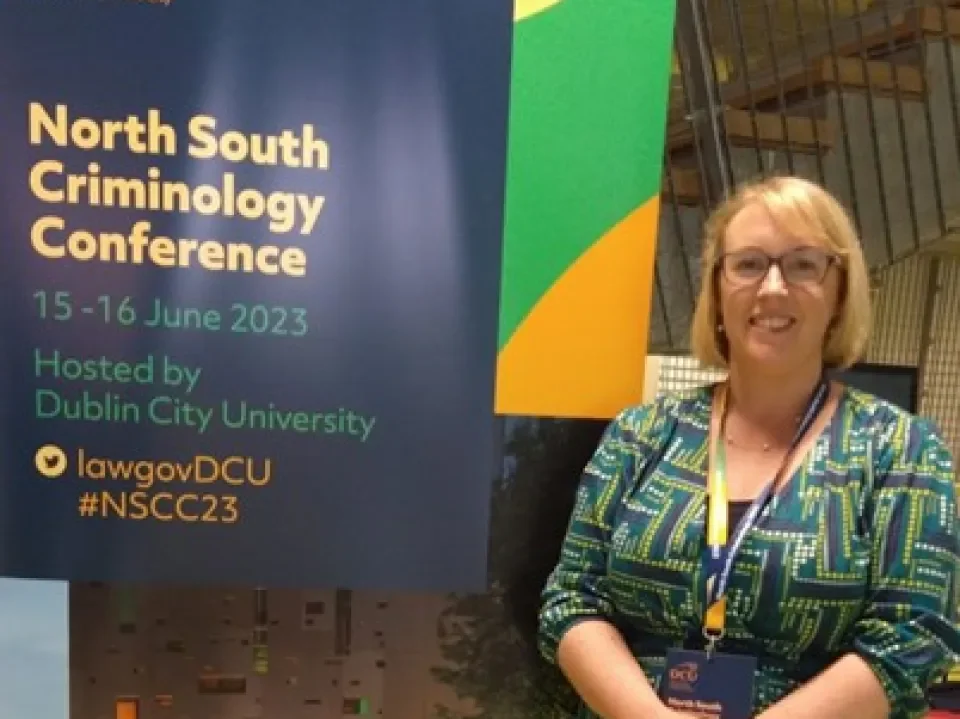

Criminology Conference at DCU brings Academic, Practice and Policy Experts Together

Professor Yvonne Daly
More than 140 delegates attended the 14th North South Criminology Conference, which was hosted by Prof Yvonne Day and the School of Law and Government.
The conference took place in June, with those in attendance from academic, practice and policy backgrounds. Fascinating papers were delivered in both parallel and plenary sessions across the two days, which responded to the conference theme: Facing the Future: Pathways, Priorities, and Pressure Points in Contemporary Criminology.
The first plenary panel focused on academic-practice engagement. Prof Liz Aston, Edinburgh Napier University, discussed the work of the Scottish Institute for Policing Research, of which she is the Director. This Institute is a collaboration between Police Scotland, the Scottish Police Authority, and 14 Scottish universities and was established to carry out high quality, independent research and to make evidence-based contributions to policing policy and practice.
Dr Sandra Peake, CEO of WAVE Trauma Centre which provides care and support for people affected by the Troubles/Conflict in Northern Ireland also addressed this session of the conference, discussing the benefits, challenges and sensitivities of conducting academic research with, or on, victims of violence and their experiences. This session was completed by an engaging and interactive discussion on co-creating principles for collaborative research in criminology, which was facilitated by Dr Ian Marder of Maynooth University.
A fascinating discussion on the policing and prosecution of rap and drill music in England and Wales was the focus of the second plenary session, which was chaired by Doireann Ansbro, Head of Legal and Policy at the Irish Council for Civil Liberties.
Dr Lambros Fatsis, University of Brighton, and Dr Anthony Gunter, Open University, provided eye-opening insights into the history of the criminalisation of certain music genres, the racial underpinnings of such criminalisation, and the contemporary courtroom presentation of purported evidence of gang membership and violent offending on the basis of rap and drill videos.
The conference organisers and delegates were honoured to have local rap/drill artist Selló present to offer further, personal insights on this topic. He took delegates through the reality behind the making of a rap/drill video, highlighting the ways in which appearances can be deceptive and presumptions can be dangerous. He also discussed the challenges of being a young Black man in Ireland.
The third, and final plenary session, chaired by Dr Mark Coen of UCD Law School, focused on historical criminology. Dr David Churchill, University of Leeds, set out the value of historical research to criminology and contended that criminologists have much to gain from engaging in historical thinking, even when examining issues which arise in a more modern policy context. Dr Lynsey Black, Maynooth University, then applied a historical criminological lens to her work on Ireland's detention of women and girls, arguing that this is of both historical and contemporary concern to criminology.
The conference also played host to the launch, by Vivian Guerin, of a new book by Prof Ian O’Donnell (UCD): Prison Life: Pain, Resistance, and Purpose, and celebrated with tea and cake.
Speaking about the conference Prof Yvonne Daly said
“It was wonderful to have so many criminology and criminal justice colleagues together at DCU for this event. There is an energy that comes from having people with similar devoted interests and expertise in the room together, and I hope that delegates went away with renewed enthusiasm for the many important research projects in which they are involved. Criminology in Ireland has blossomed into a rich discipline, and the supportive community built around this conference has been a huge part of that.”
Click for the Conference Programme and Abstracts.






